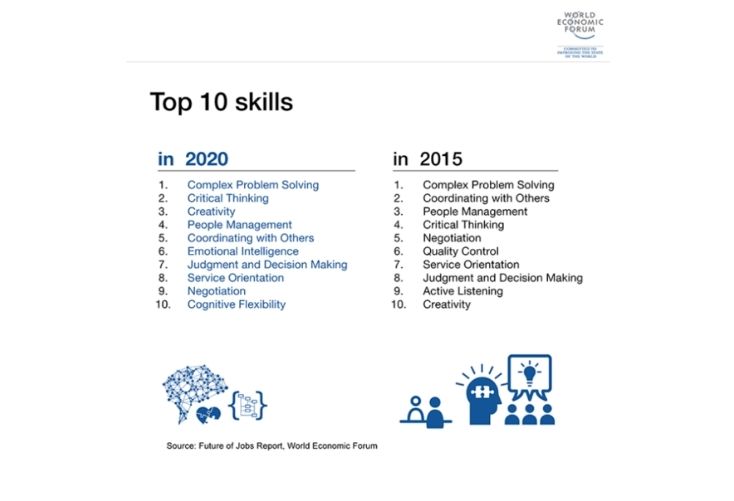- The current education system is not adequately preparing students to join the workforce.
- Education needs to respond to the technological, economic, and cultural shifts that are occurring at an ever-increasing pace.
- A report found a 722% rise in sole proprietors in the US between the years 2000 and 2017. The number of freelancers is expected to continue to rise in the coming years, which is why teaching young people to simply take instruction and memorize information will not suffice if they are one day set to become their own boss.
Education is still predominantly based on a ‘factory’ model of teaching and learning. This method of educating the masses was sufficient during the Industrial era when a large base of factory workers was needed; however, in the age of automation and rapid technological change, this system can limit the potential of individual learners to cope with the future of work.
One main issue is that most schools and colleges continue to respond to past and current work conditions and practices as opposed to predicting the future of work.
This is in no way adequately preparing future workforces to readily adjust to procedural, organizational or cultural changes.
Outdated from preschool to college
According to a Mckinsey and Company report on the future of work, less well-educated workers are most likely to be displaced by automation as roles such as data entry operators, cashiers, telemarketers, and customer service representatives become obsolete (by 2030).
Schools therefore need to ensure that when young people leave education, they have the required IT skills for the type of jobs that will exist in the near future.
The current skills gap indicates that the education system is not close to meeting the demands of the workplace at present, let alone the future. The closing of this gap is imperative as more Science, Technology, Engineering, Arts and Mathematics (STEAM)* roles take over from traditional administrative and customer service jobs.
Last year the World Economic Forum (WEF) published a report by the Britannica Group (April 2020) stating how education was no longer fit for purpose due to its focus on IQ and the ability of learners to memorize information.
There is an expectation that these skills will become redundant as Artificial Intelligence (AI) and automation become more dominant in the workplace.
Education needs to respond to the technological, economic, and cultural shifts that are occurring at an ever-increasing pace. The best model would be one that prepares young people to thrive in jobs that are not yet in existence.
We keep hearing that there is no longer such a thing as a ‘job for life.’ The next generation of employees therefore needs to be highly adaptable and ready to reimagine their role in the workplace.
So, what are the main aspects of teaching that educators should focus on?
Young people need to be equipped with open-ended skills such as critical thinking, collaborative expertise, and creative initiative that will help them to keep up with future work trends. However, before these skills can be taught in any meaningful way, education needs to be accessible to all.
One alarming issue that the coronavirus pandemic highlighted was that too many children are still not receiving access to an adequate education. This was evident not only in less economically developed nations but also in so-called developed nations.
There is a lack of equity in too many countries when it comes to providing a high standard of education. This could be down to a lack of resources at home, poor funding of schools, or simply children not attending (according to the World Economic Forum that number was 72 million children of elementary school age in 2020).
Children need a model of teaching that focuses on the development of technological abilities in addition to social, emotional, and communication skills. The core subjects of science, maths, and languages still hold much relevance but it is how these subjects are taught that will enable learners to meet future work challenges.
A recent Quickbooks Report found a 722% rise in sole proprietors in the US between the years 2000 and 2017. There were 44 million self-employed in any given week in the US in 2019, whilst the number of self-employed globally is also on a steep upward trajectory (currently an estimated 400 million worldwide).
Many more people will have no choice but to become self-employed in the future – teaching young people to simply take instruction and memorize information will not suffice if they are one day set to become their own boss.
Teaching resilience, optimal thinking, and learning-agility (being able to apply learning, learn from mistakes and relearn) are considered to be the three big learning trends for the future.
Resilience will help future generations to navigate the changes that will come their way and prevent challenges from becoming obstacles to their future work success. Creative thinking is a skill that we rarely see taught in schools yet it is vital to the development of emotional intelligence and critical analysis.
The top ten skills that schools and colleges should be teaching
 Are any countries getting it right?
Are any countries getting it right?
Finland is a great example of a country that appears to be ahead of the curve. The WEF states that Finland currently has one of the best education systems in the world. Most importantly, education is a constitutional right for all citizens. Schooling and a college education (university) are free and adult education is heavily subsidized.
Children start formal education at the age of seven, allowing more emphasis on creative learning in the early years. After school, young people have a choice of taking a vocational route or undertaking an apprenticeship route. This has been successful – 90% of school leavers take one of the two routes before seeking employment.
Finnish schools determine the knowledge and skills needed to prepare students for the constant changes of society such as – thinking and learning competences; intercultural interaction skillsand expressing personal views; language ability; self-care proficiency and daily life management. These are all abilities vital to future work-life success and in line with the top ten skills mentioned previously.
Companies hiring people without degrees
According to an article published by career experts Glassdoor (January 10, 2020) there are increasingly more companies in America offering well-paying roles to jobseekers whose highest level of educational attainment is a high-school diploma.
Although academic qualifications are still an important consideration; not having them is no longer a barrier to gaining employment with some of the most forward-thinking companies around. No longer does owning a degree automatically send job candidates to the top of the list; a strong work ethic, skills, experience, and sheer determination are equally important (if not more so).
Which companies are hiring without degrees?
- Google (US)
- Ernst and Young (UK only)
- Penguin Random House (US & UK)
- Costco Wholesale (US)
- Wholefoods (US)
- Hilton (US)
- Publix (US)
- Apple (US)
- Starbucks (US & Ireland)
- Nordstrom (US)
- Home Depot (US)
- IBM (US)
- Bank of America (US)
- Chipotle (US)
- Lowes (US)
In addition to companies hiring people without degrees, there are also some technology companies who will provide free training with the guarantee of a job. Some top Tech companies in London have offered this incentive through a free programming school.
Londoners can now apply for a free two-year coding school that comes complete with the guarantee of a job at a top tech firm after graduation. New initiative 01 Founders has launched a brand of school it plans to roll out around the UK by 2030, training up 100,000 Britons into sought-after software engineers.
The Takeaway
An education is meant to provide varied abilities, knowledge and skills for learners to build a platform on which many different job preparations can be added.
Most education systems are still ill equipped to achieve that aim, rendering school leavers inadequately prepared to meet the challenges ahead. Emphasis needs to be on individualized learning, STEAM subjects, and the development of high-level IT skills.
The teaching of reading and writing should never be undermined but the need to teach young people the skills of creative thinking, collaborative working, and critical analysis needs to be recognized – and fast!
Young people need to be empowered to imagine the future they desire and then decide how they can play a role in designing that future. Without the tools of empowerment, the future of work may be a little less bright. [/vc_column_text][/vc_column][/vc_row]



 Dr. Gleb Tsipursky – The Office Whisperer
Dr. Gleb Tsipursky – The Office Whisperer Nirit Cohen – WorkFutures
Nirit Cohen – WorkFutures Angela Howard – Culture Expert
Angela Howard – Culture Expert Drew Jones – Design & Innovation
Drew Jones – Design & Innovation Jonathan Price – CRE & Flex Expert
Jonathan Price – CRE & Flex Expert















